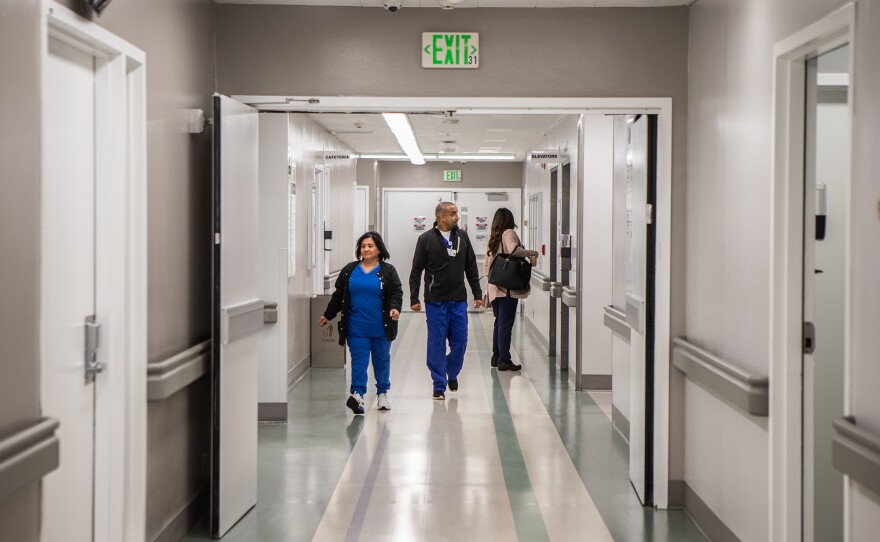California voters told lawmakers last fall that they wanted doctors to get paid more to see low-income patients. But officials for the Newsom administration blew past a federal deadline to make that happen through Medi-Cal Monday, effectively leaving millions of dollars unclaimed.
The unclaimed money is tied to Proposition 35, a ballot measure passed by 68% of voters in November. The measure committed money from a special tax on health insurance plans to increase payments to doctors and health care facilities that treat low-income patients in Medi-Cal, the state’s Medicaid program.
But first the state had to submit papers to the federal government for approval. That deadline was March 31.
Missing the deadline means that, for the first quarter of the year, doctors will not get the rate increases promised by the ballot measure. It also means that California will lose federal matching dollars intended to boost the Medi-Cal program during that time period.
The Department of Health Care Services, the agency that oversees Medi-Cal and the implementation of Prop. 35 did not respond by publication deadline to questions from CalMatters about why the state missed the funding deadline.
In recent legislative hearings, Health Care Services Director Michelle Baass stated that California’s federal application was delayed by unfilled appointments on the advisory committee established by the ballot measure to oversee spending.
Enough of those appointments were filled for the committee to legally meet, but there is still one outstanding appointment. Gov. Gavin Newsom’s office refused to respond to questions about why the appointment has not been made. The committee is set to meet for the first time April 14.
During a February hearing, another official for the health care services department said the agency never believed it would be feasible for the state to meet the March deadline.
The slow implementation is frustrating lawmakers and clinicians alike who say rate hikes are long overdue and necessary to increase access for Medi-Cal recipients.
Assemblymember Dawn Addis, a Democrat from Morro Bay, said in a recent hearing that Prop. 35 was “widely popular” and she had supported it with the hope that rate increases would begin quickly.
Lawmakers have aggressively expanded Medi-Cal benefits and eligibility in the past 10 years. Today, one in three Californians get health care through the state program. But doctors say the amount they get paid to see Medi-Cal patients hasn’t increased in two decades.
Addis said during the hearing that “94% of Californians now have health care coverage, but so many folks can’t access providers. And what people in rural areas will point to is that providers just simply cannot afford to practice in rural areas because the reimbursement is so low.”
In a separate legislative hearing, Sen. Akilah Weber Pierson noted that even with the unfilled position, the advisory committee has a quorum and could have met to discuss Prop. 35 implementation.
“This was something the voters were very, very clear about…I don’t think the residents would like for us to delay,” said Weber Pierson, a Democrat and obstetrician from San Diego. “It is extremely unfortunate that we will not be able to meet that first deadline and that we are just leaving funds on the table.”
Medi-Cal shortfall as costs increase
The missed deadline comes at a time when California is confronting other Medi-Cal challenges. The state is bracing for potential federal funding cuts that are tied to budget agreements moving through Congress.
And, the state program faces its own shortfall.
Newsom and the Department of Health Care Services are under increased scrutiny for requesting a $6 billion state loan to carry out Medi-Cal operations through the end of the year.
Learn more about legislators mentioned in this story.
Dawn AddisDemocrat, State Assembly, District 30 (San Luis Obispo)
Akilah WeberDemocrat, State Assembly, District 79 (La Mesa)
State Republican lawmakers were quick to pin the blame on Newsom’s expansion of Medi-Cal access to all income-eligible immigrants who don’t have permanent legal status.
The administration defended the expansion and pointed to other cost drivers such as increasing pharmacy costs and growing senior enrollment, but acknowledged that about half of the money from the deficit is from the immigrant expansion.
Newsom also blamed the Medi-Cal deficit partially on Prop. 35 in an interview with reporters earlier this month.
“Prop. 35 placed a lot of cost burdens as it relates to rates and so all those things have to be factored in. The voters chose that path with Prop 35, and we were clear, had strong opinions about it. The cost of (Prop. 35) would increase the cost of Medicaid and that’s happening,” Newsom said.
Health care industry backed Prop. 35
Prior to the election, Newsom stopped short of opposing the measure but said Prop. 35’s passage would limit the Legislature’s ability to address future state budget deficits because it committed the money to a specific use.
Prop. 35 was backed by nearly the entire health care industry, including doctors, hospitals, clinics and ambulance companies. Those groups supported the measure in part because Newsom and past governors had previously reneged on promises to increase Medi-Cal payments and instead used the health care tax money to support general government expenses.
The proposition allocates $2 billion annually for 2025 and 2026 to the state general fund while reserving roughly another $2 billion for rate increases and other investments providers want.
Stuart Thompson, a lobbyist for the California Medical Association, which supported the measure, advocated at a March legislative hearing for the Prop. 35 committee to meet as soon as possible. Thompson noted that some payment increases that were approved separately by the Legislature in 2023 have still not been implemented and that the state needs to work to keep the ballot measure on track.
“We really want to get our bang for the buck and make sure that the way that Prop 35 is implemented really enhances the care for the most needed here in California,” Thompson said.
CalMatters reporter Alexei Koseff contributed to this story.






